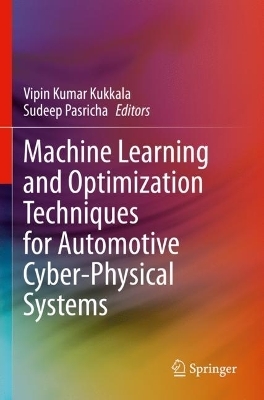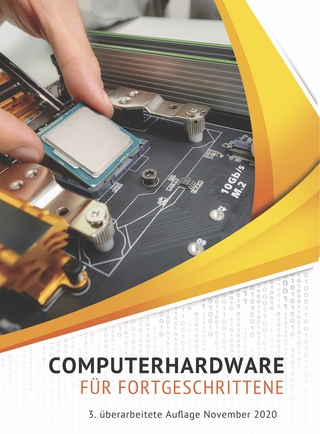
Machine Learning and Optimization Techniques for Automotive Cyber-Physical Systems
Springer International Publishing (Verlag)
9783031280184 (ISBN)
This book provides comprehensive coverage of various solutions that address issues related to real-time performance, security, and robustness in emerging automotive platforms. The authors discuss recent advances towards the goal of enabling reliable, secure, and robust, time-critical automotive cyber-physical systems, using advanced optimization and machine learning techniques. The focus is on presenting state-of-the-art solutions to various challenges including real-time data scheduling, secure communication within and outside the vehicle, tolerance to faults, optimizing the use of resource-constrained automotive ECUs, intrusion detection, and developing robust perception and control techniques for increasingly autonomous vehicles.
Vipin Kumar Kukkala received his Ph.D. in Electrical Engineering from Colorado State University, USA, in 2022, and his Bachelor of Technology (B. Tech.) degree in Electronics and Communications Engineering from Jawaharlal Nehru Technological University, Hyderabad, India, in 2013. He is currently working as a Senior High-Performance Compute Architect at NVIDIA. In the past, he worked as a graduate research assistant at Embedded, High Performance, and Intelligent Computing (EPIC) Laboratory and as a research associate intern at Hewlett Packard Enterprise (HP Labs). His research interests include the design of next-generation automotive networks, security in cyber-physical systems, machine learning, and the design of large-scale heterogeneous systems. He has published multiple research papers (journals: 6, conferences: 6, total: 12) in peer-reviewed journals including ACM Transactions on Embedded Computing Systems (TECS), IEEE Transactions on Computer-Aided Design of IntegratedCircuits and Systems (TCAD), IEEE Transactions on Vehicular Technology (TVT), ACM Transactions on Design Automation of Electronic Systems (TODAES), IEEE Consumer Electronics Magazine (CEM), and various conferences including IEEE/ACM Asia and South Pacific Design Automation Conference (ASP-DAC), IEEE/ACM International Symposium on Network-on-Chip (NOCS), IEEE Transportation Electrification Conference (TEC), IEEE/ACM Programming Environments for Heterogeneous Computing (PEHC), and IFAC Workshop on Engine and Powertrain Control, Simulation and Modeling. He also contributed to two book chapters and co-authored a U.S. Patent.Sudeep Pasricha is a Walter Scott Jr. College of Engineering Professor in the Department of Electrical and Computer Engineering, the Department of Computer Science, and the Department of Systems Engineering at Colorado State University. He is Director of the Embedded, High Performance, and Intelligent Computing (EPIC) Laboratory and the Chair of Computer Engineering. Prof. Pasricha received the B.E. degree in Electronics and Communication Engineering from Delhi Institute of Technology, India, in 2000, and his Ph.D. in Computer Science from the University of California, Irvine in 2008. He has received funding for his research from various sponsors such as the NSF, SRC, AFOSR, ORNL, DoD, Fiat-Chrysler, HPE, and NASA. He has co-authored multiple books and published more than 250 research articles in peer-reviewed conferences and journals. He is a Senior Member of the IEEE (Computer Society) and Distinguished Member of the ACM. Prof. Pasricha's research broadly focuses on software algorithms, hardware architectures, and hardware-software co-design for energy-efficient, fault-tolerant, real-time, and secure computing. These efforts target multi-scale computing platforms, including embedded and Internet of Things (IoT) systems, cyber-physical systems, mobile devices, and datacenters. He has received 16 Best Paper Awards and Nominations at various IEEE and ACM conferences, including at DAC, ASPDAC, NOCS, GLSVLSI, SLIP, AICCSA, and ISQED. Other notable awards include: the 2022 ACM Distinguished Speaker selection, the 2019 George T. Abell Outstanding Research Faculty Award, the 2016-2018 University Distinguished Monfort Professorship, 2016-2019 Walter Scott Jr. College of Engineering Rockwell-Anderson Professorship, 2018 IEEE-CS/TCVLSI mid-career research Achievement Award, the 2015 IEEE/TCSC Award for Excellence for a mid-career researcher, the 2014 George T. Abell Outstanding Mid-career Faculty Award, and the 2013 AFOSR Young Investigator Award. He is currently the Vice Chair of ACM SIGDA and a Senior Associate Editor for the ACM Journal of Emerging Technologies in Computing (JETC). He is an Associate Editor for multiple other IEEE and ACM journals. He has been an Organizing Committee Member of several IEEE/ACM conferences, and has also served as General Chair and Program Chair for many of these conferences. He holds an affiliatefa
Chapter 1 Reliable Real-time Message Scheduling in Automotive Cyber-Physical Systems.- Chapter 2 Evolvement of Scheduling Theories for Autonomous Vehicles.- Chapter 3 Distributed Coordination and Centralized Scheduling for Automobiles at Intersections.- Chapter 4 Security Aware Design of Time-Critical Automotive Cyber-Physical Systems.- Chapter 5 Secure by Design Autonomous Emergency Braking Systems in Accordance with ISO 21434.- Chapter 6 Resource Aware Synthesis of Automotive Security Primitives.- Chapter 7 Gradient-free Adversarial Attacks on 3D Point Clouds from LiDAR Sensors.- Chapter 8 Internet of Vehicles- Security and Research Road map.- Chapter 9 Protecting Automotive Controller Area Network: A Review on Intrusion Detection Methods Using Machine Learning Algorithms.- Chapter 10 Real-Time Intrusion Detection in Automotive Cyber-Physical Systems with Recurrent Autoencoders.- Chapter 11 Stacked LSTMs based Anomaly Detection in Time-Critical Automotive Networks.- Chapter 12 Deep AI for Anomaly Detection in Automotive Cyber-Physical Systems.- Chapter 13 Physical Layer Intrusion Detection and Localization on CAN bus.- Chapter 14 Spatiotemporal Information based Intrusion Detection Systems for In-vehicle Networks.- Chapter 15 In-Vehicle ECU Identification and Intrusion Detection from Electrical Signaling.- Chapter 16 Machine Learning for Security Resiliency in Connected Vehicle Applications.- Chapter 17 Object Detection in Autonomous Cyber-Physical Vehicle Platforms: Status and Open Challenges.- Chapter 18 Scene-Graph Embedding for Robust Autonomous Vehicle Perception.- Chapter 19 Sensing Optimization in Automotive Platforms.- Chapter 20 Unsupervised Random Forest Learning for Traffic Scenario Categorization.- Chapter 21 Development of Computer Vision Models for Drivable Region Detection in Snow Occluded Lane Lines.-Chapter 22 Machine Learning Based Perception Architecture Design for Semi-Autonomous Vehicles.- Chapter 23.- Predictive Control During Acceleration Events to Improve Fuel Economy.- Chapter 24 Learning-based social coordination to improve safety and robustness of cooperative autonomous vehicles in mixed traffic.- Chapter 25 Evaluation of Autonomous Vehicle Control Strategies Using Resilience Engineering.- Chapter 26 Safety-assured Design and Adaptation of Connected and Autonomous Vehicles.- Chapter 27 Identifying and Assessing Research Gaps for Energy Efficient Control of Electrified Autonomous Vehicle Eco-driving.
| Erscheinungsdatum | 07.09.2024 |
|---|---|
| Zusatzinfo | XV, 789 p. |
| Verlagsort | Cham |
| Sprache | englisch |
| Maße | 155 x 235 mm |
| Gewicht | 1200 g |
| Themenwelt | Informatik ► Weitere Themen ► Hardware |
| Technik ► Elektrotechnik / Energietechnik | |
| Schlagworte | Automotive cybersecurity • Automotive Embedded Systems • Automotive Scheduling • Intrusion Detection Systems • machine learning • Reliable automotive networks |
| ISBN-13 | 9783031280184 / 9783031280184 |
| Zustand | Neuware |
| Informationen gemäß Produktsicherheitsverordnung (GPSR) | |
| Haben Sie eine Frage zum Produkt? |
aus dem Bereich


